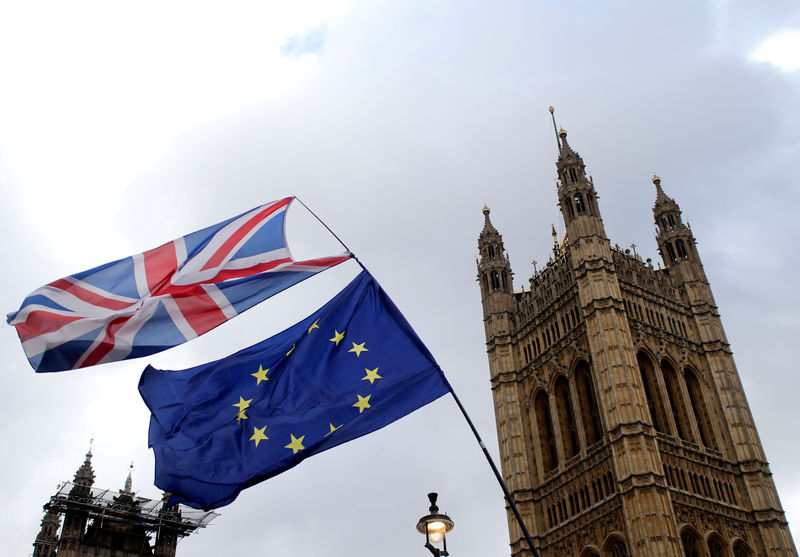By Jonathan Cable
LONDON (Reuters) - Britain will eventually leave the European Union and agree a free-trade deal with the bloc, according to the vast majority of economists polled by Reuters who were, however, split on whether the two sides would divorce on Oct. 31.
Prime Minister Theresa May failed to get her Withdrawal Agreement ratified by the British parliament on three attempts so the EU allowed a Brexit delay until the end of October, giving May time to try to convince lawmakers to reach agreement.
When asked if the latest deadline - delayed from March 29 - would be extended, 17 of 33 economists who answered an extra question in the May 3-10 Reuters poll said it would not.
"Failure to come to an agreement runs the risk that the EU will simply lose patience in October and not grant any extension," said Peter Dixon at Commerzbank (DE:CBKG).
"We are by no means out of the woods."
It's nearly three years since the June 2016 referendum when Britons shocked much of the world and voted to leave the EU but it is still unclear how, when, or even if it will ever quit the club it joined in 1973.
But the median forecast in the latest survey gave the chance of a disorderly Brexit - where no deal is agreed and an outcome Reuters polls have repeatedly said would be harmful to both sides - at 15%, as it was in March and April.
Only one of 50 respondents gave a probability above 50%.
Still, as they have in all Reuters polls since late 2016 most economists said the two sides would settle on a free-trade deal. The second most likely outcome was again Britain as a member of the European Economic Area, paying into the EU budget to maintain access to the EU's single market.
In third spot was Brexit being cancelled - once more ahead of Britain leaving without an agreement and trading under World Trade Organization rules, which came last.
"All options remain on the table in the UK, including no Brexit, a hard Brexit and even another extension beyond October," said Kallum Pickering at Berenberg.
WILL THEY, WON'T THEY?
Britain avoided the recession predicted in the event the country decided to leave the EU and the median chance of one in the next year was only 20%, down from 25% given last month. For the next two years, the probability was an unchanged 25%.
However, growth is expected to remain tepid and the world's fifth largest economy will grow 0.2-0.4% per quarter across the forecast horizon, from here through to the end of 2020, unchanged from last month's poll.
Inflation, however, is expected to rise and will average 1.9% this year and 2.0% in 2020 and 2021 - matching the Bank of England's target - the poll found.
Yet the central bank is unlikely to do much with monetary policy. Monetary Policy Committee member Michael Saunders said in an interview published on Thursday the BOE was unlikely to raise interest rates far or fast, even if the economy picks up after a smooth Brexit.
Economists largely agreed with Saunders and medians suggests borrowing costs will rise 25 basis points early next year, taking Bank Rate to 1.00%. That call was on a knife edge, with just over half expecting it to come in the first quarter.
It will be 2021 before another 25 basis points are added, the poll found, and two economists have pencilled in a cut to Bank Rate next year.
"With CPI inflation – which stood at 1.9% in March – yet to reflect higher labour costs, it is not surprising that the MPC is in no rush to raise rates," said Ruth Gregory at Capital Economics.
(Polling by Sarmista Sen and Hari Kishan; Editing by Toby Chopra)
